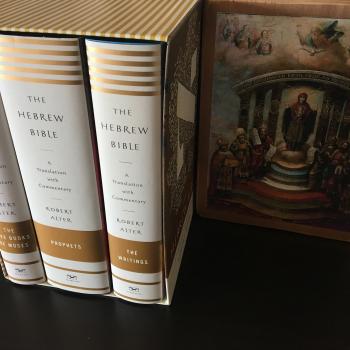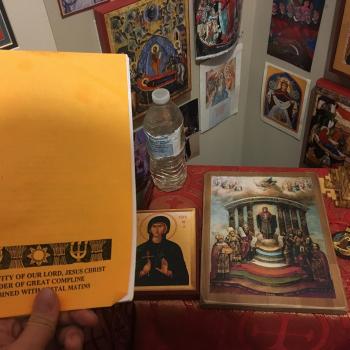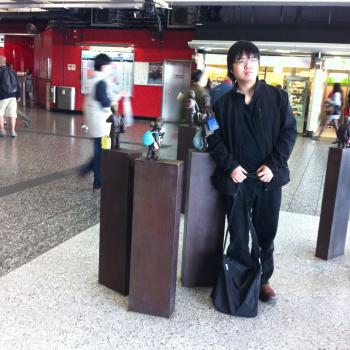[I did not preach today, and I do not envy those who must. However, in solidarity with those who mourn and those who must preach despite their mourning, this is what I might have said. I was also very affected by the Rev. Nadia Bolz-Weber’s sermon on the Aurora shootings. God, come to my assistance; Lord, make haste to help me.]
(Readings are taken from the Revised Common Lectionary, Year C: Zeph. 3.14-18a; Is. 12; Phil. 4.4-7; Lk. 3.10-18)
In the Name of the Father and of the Son and of the Holy Spirit. Amen.
The Third Sunday of Advent is, as my wife likes to say, the day to light the pink candle. It is not without reason that this Sunday is called Gaudete Sunday, a Sunday when the readings, the music, the church decorations, and even the pink candle are supposed to be gaudy. It’s supposed to be a party, a day of joy. And thus, our first reading in Zephaniah 3, like our responsorial psalm from Isaiah 12, calls on the daughter of Zion to rejoice, for the Lord has saved her from her enemies; in our epistle from Philippians 4, St. Paul tells the church at Philippi to rejoice—‘and I will say it again, rejoice!’
If only we could.
Can we indeed say that the Lord has been the saviour from our enemies when 26 people, 20 of them children, are gunned down mercilessly in an elementary school in a Connecticut town? Can we rejoice with St. Paul when, in a completely unrelated incident, 23 kids are stabbed in a school in China? Are we even allowed to light the pink candle and be gaudy when we have endured our nineteenth such shooting spree in America in five years, countless such murders in China, and untold accounts of violence worldwide?
Compounding our grief is the way that these horrors have immediately been politicized. Barack Obama may have responded more as a parent than as a president, wiping away tears from his eyes as he read his statement on the Connecticut shootings, but already, our civil discourse from the left is screaming for gun control, from the right is raging for concealed carry firearms, and from the cynical is wondering how anyone in good conscience could manipulate grief on this level for politics. Our theological discourse is no better. We have heard from the theologians and pastors who have no words or answers for our innumerable questions, and we have heard from those who have an answer that God in his sovereign will did not stop the bloodshed. We want to celebrate the heroes—already, our Facebook and Twitter feeds are flooded by stories of teachers and the principal who sacrificed their lives for their students, and we do call them ‘heroes,’ except when we do, our voices choke with grief and we cannot actually say it, reframe the situation, and think positive about what hope we must have for humanity now.
No. We are not joyful. We are not even pretending to be. We have had enough.
We preachers have been told that the task of preaching after such tragedy is difficult, if not impossible. We are told that the congregation wants us to be empathetic, to simply understand, to keep our mouths shut. Yet we are preachers, we are also told, and so we must say something. Whether our theology is that we are shepherds over a flock, fellow pilgrims in the midst of the people of God, or somewhere in the middle of that continuum, the fact remains that, as much as it seems that no one wants any of us to say anything, our liturgy requires that we speak.
But what do we say—indeed, what can we say?—especially in the midst of such senseless violence on Gaudete Sunday?
The Gospel tells us that the crowds asked John the Baptizer, ‘What shall we do?’ The crowds asked John the Baptizer what they should do. We are told that the crowds consisted of a motley crew of people, tax collectors and Roman soldiers in tow. The crowds, we are told, are not innocent of violence, passive victims of Roman occupation with its culture of violence. The crowds, as implied from last week’s Gospel earlier in Luke 3, know very well the level of violence it takes to maintain Roman colonization in Palestine. Pontius Pilate was known to violently repress, if not pre-empt, any sign of Jewish identity politics. And this was just an example: we haven’t talked about the political intrigue at multiple levels of the colonial government managed by the Herods and the Temple rulers. The violence then was as senseless as the violence now. And yet, with collaborators with these regimes of violence like tax collectors and Roman soldiers in the crowds, the crowds, it is implied, are very much collaborators with regimes of terror, empires of murderous liberation, cultures of death that fetishize weaponry for the recreation of bloodlust.
John is the voice crying out in the wilderness. Like us, John had to preach, even in the midst of a senseless culture of violence. Attuned to the injustice of the senseless violence they have experienced as well as their own complex complicity in it, the crowds ask John: ‘What shall we do?’
What does John tell them to do?
Does John give the socially and politically conservative answer, that what is simply needed is a conversion of the individual heart, that weapons control is useless because the central problem of personal repentance has not been solved?
Does John give the concerned parental response, that the private sphere is under threat from such violence, that public safety will soon be a myth if such violence continues, and that for the sake of our children, we must enact some policy to make sure this never happens again?
Does John give the ‘I have no words to say’ sermon, a reflection on mystery in the midst of grief, that God weeps with the wretched of the earth but really has nothing better to do than to cry with you as you are terrorized?
No. None of the above.
In the midst of such colonization, terror, and violence, John’s answer is a call to radical hospitality. If you have two coats, he says, give one to your neighbour. If you have food and your neighbour doesn’t, share it. If you are a tax collector, don’t collect extra tips. If you are a soldier, you are not to use brute force, extortion, and the secrecy of lies to get your way.
John’s call to action is cryptic. It is as if in the midst of the senseless violence in both first-century Palestine and the twenty-first century globalized world, John is calling us to a defiant hospitality. In the midst of violence, the Church defies the common sense of private security that we need to batten down the hatches and arm ourselves for safety. No, John says, we open our doors wider.
John the Baptizer is saying what our other readings for Gaudete Sunday are saying. Rejoice, St. Paul says, again I say it, rejoice, because hope against hope, sending your petitions with thanksgiving to God, the peace of Christ that surpasses all understanding and defies the common sense of anxiety in the midst of this crooked and perverse generation will guard your hearts and minds in Christ Jesus. Rejoice, the prophets Zephaniah and Isaiah say, for God is our savior from our enemies, he has removed our judgment, he sings over us now as songs are sung at festivals. Rejoice. Be hospitable. Open wide your gates, daughter of Zion.
These acts of joy run counter to our feelings of horror, despair, anger, and rage at the events of violence that we have so viscerally experienced this week. Our common sense tells us that we should be taking up arms for private security. Our righteous anger should move us to call on the state to save us from our ‘nasty, brutish, and short’ ways. Our emotional sensitivities know that any display of joy will be viewed as insensitive and that any mention of gaudiness should be regarded as distasteful.
How can we be so stupid?
Because, John goes on, someone is coming, mightier than he is, bringing a baptism by fire and the Holy Spirit. Someone is coming, the thongs of whose sandals he is unworthy to untie, to actually do some justice, to separate the wheat from the chaff, to actually set the world right.
He is coming, John says, but as we look forward to his return, he isn’t back yet. So yes, we should grieve at this present darkness. Let your voices choke as you remember Connecticut, as you think of China, as you contemplate the imperial cultures of death that have the world in its grip. Yes, we should have no words to say to explain the horror. Yes, do be angry, rage at the senselessness. But as the people of God, in our sorrow and in our anger, in our disbelief at the level of injustice that has been perpetrated this week, in the activism for justice that will no doubt rightfully ensue from this, we also defy the common sense that calls us to take up arms and protect ourselves. No, hope against hope, we declare with our actions that this is indeed a time to act, but with the radical acts of hospitality, to let our rejoicing not be empty words, but shocking deeds of expansive welcome to the stranger, solidarity with the hungry and the naked, and renunciation of the ways of extortion and greed.
Today is the Third Sunday of Advent. Jesus is coming, winnowing fork in hand, to sort out the wheat from the chaff. We grieve with the grieving, mourn with the mourning, are in solidarity with those who cry out against the senseless violence of this week, are stopped silent in our attempts to give simple answers about just what happened. And yet with tears in our eyes, choking in our voices, and anger to the depths of our bowels, we rejoice defiantly by flinging open our hearts and our doors to welcome the stranger and love our neighbour. We do this because the one who holds the winnowing fork in his hand came to live and die as one of us. He stretched out his arms upon the cross, a victim of the very senseless brutality and injustice against which we rage today. His disciples, once the followers of the same John the Baptizer who had proclaimed this radical hospitality, locked themselves in an upper room for personal security, fleeing, hiding, defending themselves against the unjust, horrible violence that took their Lord’s life. And yet, hope against hope, defiant against all common sense, confounding all sense of reality, in a story that will strike us in our grief as the stupidest wishful thinking imaginable if only it didn’t happen, Jesus walked through those locked doors into that room and said to them, ‘It is I. Do not be afraid.’
Cry out with joy and gladness, then, for among you is the great and Holy One of Israel, Jesus Christ who has died, is risen, and will come again. Lift up your hearts; let us give thanks to the Lord our God; let us share in the joy of the Triune God; let us love our neighbours with the expansive love of Jesus Christ who comes to us even now in our grief, in our horror, in our confusion, and in our anger, and says to us—indeed, hope against hope, he calls us by name and says, ‘It is I. I have risen. Do not be afraid.’
O God, we pray then, we have heard with our ears, our ancestors have told us, what deeds you performed in their days, in the days of old; you with your own hand drove out the nations, but them you planted; you afflicted the peoples, but them you set free. Yet you have rejected us and abased us, and have not gone out with our armies. You have made us like sheep for slaughter, and have scattered us among the nations. Because of you we are being killed all day long, and accounted as sheep for the slaughter. Rouse yourself! Why do you sleep, O Lord? Awake, do not cast us off forever! Why do you hide your face? Why do you forget our affliction and oppression? For we sink down to the dust; our bodies cling to the ground. Rise up, come to our help. Redeem us for the sake of your steadfast love. I believe; help thou my unbelief. O Lord, in you have I trusted; let me never be confounded.
Amen.











